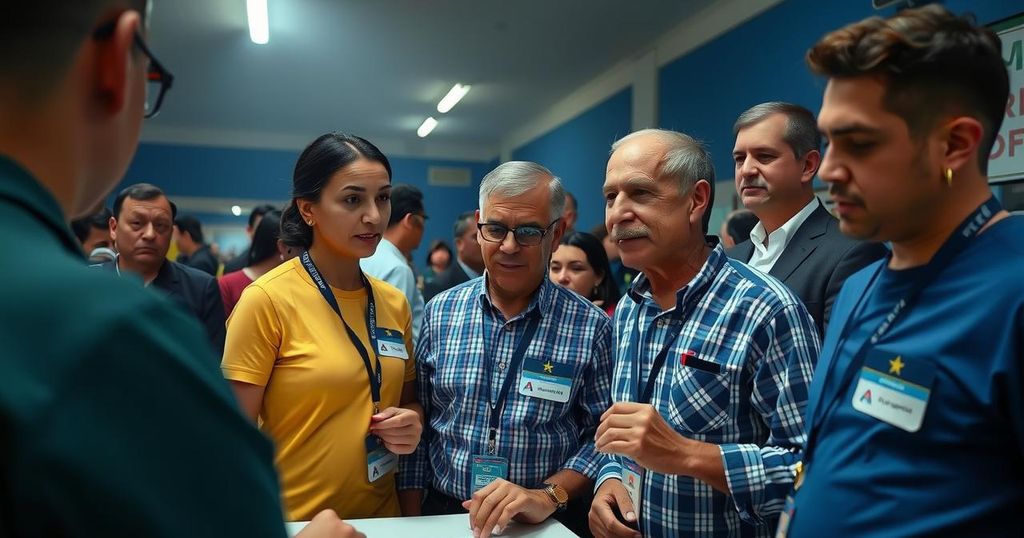Politics
2024 ELECTIONS, ARGENTINA, ASIA, BRAZIL, BRICS, COLORADO PARTY, CUBA, DELGADO, ELECTION, ELECTIONS, FRENTE AMPLIO, JOSE “ PEPE, LUIS LACALLE POU, MEXICO, MUJICA, NATIONAL PARTY, NORTH AMERICA, OR, PHILIPPINES, PRESIDENTIAL ELECTION, SOUTH AMERICA, TRADE RELATIONS, URUGUAY, VENEZUELA, VOTER TURNOUT
Fatima Khan
0 Comments
Uruguay Presidential Run-Off: A Critical Decision for the Nation
Uruguay is currently holding a presidential run-off election where leftist candidate Yamandu Orsi seeks to reclaim power against National Party’s Alvaro Delgado. With the election characterized by a tight race and political stability, voters face critical economic challenges that have influenced their decision-making process.
Voting has commenced in the presidential run-off election in Uruguay, where the leftist alliance led by renowned former President Jose “Pepe” Mujica seeks to reclaim power after five years of a right-leaning government. Polling stations opened at 8 AM local time and will close at 7:30 PM, with preliminary results anticipated two hours post close. The electorate must choose between Yamandu Orsi, representing the Broad Front, and Alvaro Delgado, a candidate from the National Party, which is part of the outgoing center-right coalition.
With the population of Uruguay numbered at 3.4 million, recent polls indicate a tightly contested race, with the potential for less than 25,000 votes to differentiate the leading candidates. While significant political polarization has characterized elections in neighboring countries such as Argentina and Brazil, Uruguay’s political landscape is characterized by a less adversarial environment, allowing for notable overlap between the competing parties.
Despite the 50 percent approval rating enjoyed by President Luis Lacalle Pou, the ruling coalition faces criticisms over rising crime rates, despite improvements in employment and wages during their tenure. Yamandu Orsi won 43.9 percent of the vote in October for the Broad Front, while Alvaro Delgado captured 26.8 percent, bolstered by support from the Colorado Party, together making up a notable voting bloc.
Orsi has emphasized his intention to maintain continuity rather than implement drastic policy changes, while Delgado has appealed to voters by promoting the notion of continuing a successful government. Both candidates are vying for the support of approximately 8 percent of first-round voters who supported smaller parties, as well as those who abstained from voting previously. However, both candidates have refrained from introducing new policies in their campaigns, which seems to have minimal impact on voter sentiment following a recent televised debate.
As Uruguay navigates these electoral dynamics, one overarching question persists: will this election diverge from the global trend in which incumbent parties have experienced declining support? Amid inflationary pressures and rising living costs, voters in several countries have expressed their dissatisfaction with prevailing governments.
The political context of this run-off election in Uruguay is notable due to the previous five years of governance by a right-wing coalition led by President Luis Lacalle Pou. The current electoral scenario features a contest between the leftist Frente Amplio, which was previously in power, and the National Party, reflecting a balance of political ideologies within Uruguay’s evolved democratic landscape. This election is pivotal, not only for the country but also as part of broader regional electoral trends in Latin America.
In conclusion, the presidential run-off election in Uruguay stands as a critical point for both the leftist and right-wing coalitions as they vie for power in a relatively stable political atmosphere. With a close race between Yamandu Orsi and Alvaro Delgado and significant implications for the electorate’s sentiment following economic challenges, the outcome may shape Uruguay’s future and possibly counter the trend of declining support for incumbency observed in various nations globally.
Original Source: www.aljazeera.com




Post Comment